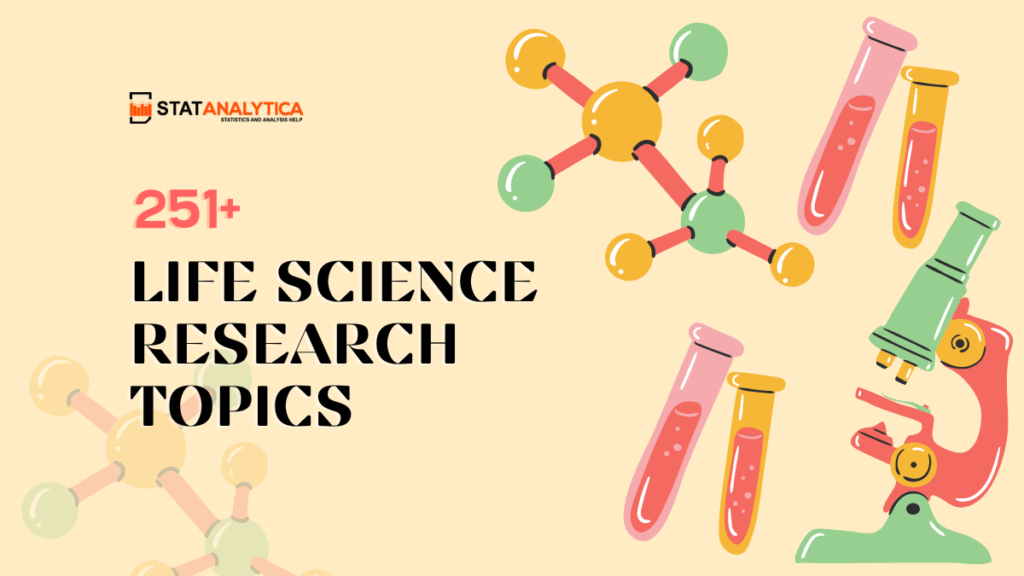Life science research is like peering into the intricate workings of the universe, but instead of stars and galaxies, it delves into the mysteries of life itself. From unraveling the secrets of our genetic code to understanding ecosystems and everything in between, life science research encompasses a vast array of fascinating topics. In this blog post, we’ll embark on a journey through some of the most captivating life science research topics within the realm of life science research.

What is research in life science?
Table of Contents
Research in life science involves the systematic investigation and study of living organisms, their interactions, and their environments. It encompasses a wide range of disciplines, including biology, genetics, ecology, microbiology, neuroscience, and more.
Life science research aims to expand our understanding of the fundamental principles governing life processes, uncover new insights into biological systems, develop innovative technologies and therapies, and address pressing challenges in areas such as healthcare, agriculture, and conservation.
251+ Life Science Research Topics: Category Wise
Genetics and Genomics
- Genetic basis of inherited diseases
- Genome-wide association studies
- Epigenetics and gene regulation
- Evolutionary genomics
- CRISPR/Cas9 gene editing technology
- Pharmacogenomics and personalized medicine
- Population genetics
- Functional genomics
- Comparative genomics across species
- Genetic diversity and conservation
Biotechnology and Bioengineering
- Biopharmaceutical production
- Metabolic engineering for biofuel production
- Synthetic biology applications
- Bioremediation techniques
- Nanotechnology in drug delivery
- Tissue engineering and regenerative medicine
- Biosensors for environmental monitoring
- Bioprocessing optimization
- Biodegradable plastics and sustainable materials
- Agricultural biotechnology for crop improvement
Ecology and Environmental Biology
- Biodiversity hotspots and conservation strategies
- Ecosystem services and human well-being
- Climate change impacts on ecosystems
- Restoration ecology techniques
- Urban ecology and biodiversity
- Marine biology and coral reef conservation
- Habitat fragmentation and species extinction
- Ecological modeling and forecasting
- Wildlife conservation genetics
- Microbial ecology in natural environments
Neuroscience and Cognitive Science
- Brain mapping techniques (fMRI, EEG, etc.)
- Neuroplasticity and learning
- Neural circuitry underlying behavior
- Neurodegenerative diseases (Alzheimer’s, Parkinson’s, etc.)
- Neural engineering for prosthetics
- Consciousness and the mind-body problem
- Psychiatric genetics and mental health disorders
- Neuroimaging in psychiatric research
- Developmental cognitive neuroscience
- Neural correlates of consciousness
Evolutionary Biology
- Mechanisms of speciation
- Molecular evolution and phylogenetics
- Coevolutionary dynamics
- Evolution of antibiotic resistance
- Cultural evolution and human behavior
- Evolutionary consequences of climate change
- Evolutionary game theory
- Evolutionary medicine and infectious diseases
- Evolutionary psychology and human cognition
- Paleogenomics and ancient DNA analysis
Cell Biology and Physiology
- Cell cycle regulation and cancer biology
- Stem cell biology and regenerative medicine
- Organelle dynamics and intracellular transport
- Cellular senescence and aging
- Ion channels and neuronal excitability
- Metabolic pathways and cellular energetics
- Cell signaling pathways in development and disease
- Autophagy and cellular homeostasis
- Mitochondrial function and disease
- Cell adhesion and migration in development and cancer
Microbiology and Immunology
- Microbiome composition and function
- Antibiotic resistance mechanisms
- Host-microbe interactions in health and disease
- Viral pathogenesis and vaccine development
- Microbial biotechnology for waste treatment
- Immunotherapy approaches for cancer treatment
- Microbial diversity in extreme environments
- Antimicrobial peptides and drug discovery
- Microbial biofilms and chronic infections
- Host immune responses to viral infections
Biomedical Research and Clinical Trials
- Translational research in oncology
- Precision medicine approaches
- Clinical trials for gene therapies
- Biomarker discovery for disease diagnosis
- Stem cell-based therapies for regenerative medicine
- Pharmacokinetics and drug metabolism studies
- Clinical trials for neurodegenerative diseases
- Vaccine efficacy trials
- Patient-reported outcomes in clinical research
- Health disparities and clinical trial participation
Emerging Technologies and Innovations
- Single-cell omics technologies
- 3D bioprinting for tissue engineering
- CRISPR-based diagnostics
- Artificial intelligence applications in life sciences
- Organs-on-chip for drug screening
- Wearable biosensors for health monitoring
- Nanomedicine for targeted drug delivery
- Optogenetics for neuronal manipulation
- Quantum biology and biological systems
- Augmented reality in medical education
Ethical, Legal, and Social Implications (ELSI) in Life Sciences
- Privacy concerns in genomic research
- Ethical considerations in gene editing technologies
- Access to healthcare and genetic testing
- Intellectual property rights in biotechnology
- Informed consent in clinical trials
- Animal welfare in research
- Equity in environmental decision-making
- Data sharing and reproducibility in science
- Dual-use research and biosecurity
- Cultural perspectives on biomedicine and genetics
Public Health and Epidemiology
- Disease surveillance and outbreak investigation
- Global health disparities and access to healthcare
- Environmental factors in disease transmission
- Health impacts of climate change
- Social determinants of health
- Infectious disease modeling and forecasting
- Vaccination strategies and herd immunity
- Epidemiology of chronic diseases
- Mental health epidemiology
- Occupational health and safety
Plant Biology and Agriculture
- Crop domestication and evolution
- Plant-microbe interactions in agriculture
- Genetic engineering for crop improvement
- Plant hormone signaling pathways
- Abiotic stress tolerance mechanisms in plants
- Soil microbiology and nutrient cycling
- Agroecology and sustainable farming practices
- Plant secondary metabolites and natural products
- Plant developmental biology
- Plant epigenetics and environmental adaptation
Bioinformatics and Computational Biology
- Genome assembly and annotation algorithms
- Phylogenetic tree reconstruction methods
- Metagenomic data analysis pipelines
- Machine learning approaches for biomarker discovery
- Structural bioinformatics and protein modeling
- Systems biology and network analysis
- Transcriptomic data analysis tools
- Population genetics simulation software
- Evolutionary algorithms in bioinformatics
- Cloud computing in life sciences research
Toxicology and Environmental Health
- Mechanisms of chemical toxicity
- Risk assessment methodologies
- Environmental fate and transport of pollutants
- Endocrine disruptors and reproductive health
- Nanotoxicology and nanomaterial safety
- Biomonitoring of environmental contaminants
- Ecotoxicology and wildlife health
- Air pollution exposure and respiratory health
- Water quality and aquatic ecosystems
- Environmental justice and health disparities
Aquatic Biology and Oceanography
- Marine biodiversity conservation strategies
- Ocean acidification impacts on marine life
- Coral reef resilience and restoration
- Fisheries management and sustainable harvesting
- Deep-sea biodiversity and exploration
- Harmful algal blooms and ecosystem health
- Marine mammal conservation efforts
- Microplastics pollution in aquatic environments
- Ocean circulation and climate regulation
- Aquaculture and mariculture technologies
Social and Behavioral Sciences in Health
- Health behavior change interventions
- Social determinants of health disparities
- Health communication strategies
- Community-based participatory research
- Patient-centered care approaches
- Cultural competence in healthcare delivery
- Health literacy interventions
- Stigma reduction efforts in public health
- Health policy analysis and advocacy
- Digital health technologies for behavior monitoring
Bioethics and Biomedical Ethics
- Ethical considerations in human subjects research
- Research ethics in vulnerable populations
- Informed consent in clinical trials
- Privacy and data protection in healthcare
- Professional integrity and scientific misconduct
- Ethical implications of genetic testing
- Access to healthcare and health equity
- End-of-life care and euthanasia debates
- Reproductive ethics and assisted reproduction
- Ethical challenges in emerging biotechnologies
Forensic Science and Criminalistics
- DNA fingerprinting techniques
- Forensic entomology and time of death estimation
- Trace evidence analysis methods
- Digital forensics in criminal investigations
- Ballistics and firearm identification
- Forensic anthropology and human identification
- Bloodstain pattern analysis
- Arson investigation techniques
- Forensic toxicology and drug analysis
- Forensic psychology and criminal profiling
Nutrition and Dietary Science
- Nutritional epidemiology studies
- Diet and chronic disease risk
- Functional foods and nutraceuticals
- Macronutrient metabolism pathways
- Micronutrient deficiencies and supplementation
- Gut microbiota and metabolic health
- Dietary interventions for weight management
- Food safety and risk assessment
- Sustainable diets and environmental impact
- Cultural influences on dietary habits
Entomology and Insect Biology
- Insect behavior and communication
- Insecticide resistance mechanisms
- Pollinator decline and conservation efforts
- Medical entomology and vector-borne diseases
- Invasive species management strategies
- Insect biodiversity in urban environments
- Agricultural pest management techniques
- Insect physiology and biochemistry
- Social insects and eusociality
- Insect symbiosis and microbial interactions
Zoology and Animal Biology
- Animal behavior and cognition
- Conservation genetics of endangered species
- Reproductive biology and breeding programs
- Wildlife forensics and illegal wildlife trade
- Comparative anatomy and evolutionary biology
- Animal welfare and ethics in research
- Physiological adaptations to extreme environments
- Zoological taxonomy and species discovery
- Animal communication and signaling
- Human-wildlife conflict mitigation strategies
Biochemistry and Molecular Biology
- Protein folding and misfolding diseases
- Enzyme kinetics and catalytic mechanisms
- Metabolic regulation in health and disease
- Signal transduction pathways
- DNA repair mechanisms and genome stability
- RNA biology and post-transcriptional regulation
- Lipid metabolism and membrane biophysics
- Molecular interactions in drug design
- Bioenergetics and cellular respiration
- Structural biology and X-ray crystallography
Cancer Biology and Oncology
- Tumor microenvironment and metastasis
- Cancer stem cells and therapy resistance
- Angiogenesis and tumor vasculature
- Immune checkpoint inhibitors in cancer therapy
- Liquid biopsy techniques for cancer detection
- Oncogenic signaling pathways
- Personalized medicine approaches in oncology
- Radiation therapy and tumor targeting strategies
- Cancer genomics and precision oncology
- Cancer prevention and lifestyle interventions
Developmental Biology and Embryology
- Embryonic stem cell differentiation
- Morphogen gradients and tissue patterning
- Developmental genetics and model organisms
- Regenerative potential in vertebrates and invertebrates
- Developmental plasticity and environmental cues
- Embryo implantation and pregnancy disorders
- Germ cell development and fertility preservation
- Cell fate determination in development
- Evolutionary developmental biology (evo-devo)
- Organogenesis and tissue morphogenesis
Pharmacology and Drug Discovery
- Drug-target interactions and pharmacokinetics
- High-throughput screening techniques
- Structure-activity relationship studies
- Drug repurposing strategies
- Pharmacogenomics and personalized medicine
- Natural product drug discovery
- Drug delivery systems and nanomedicine
- Pharmacovigilance and drug safety monitoring
- Pharmacoeconomics and healthcare outcomes
- Drug metabolism and drug-drug interactions
Stem Cell Research
- Induced pluripotent stem cells (iPSCs) technology
- Stem cell therapy applications in regenerative medicine
- Stem cell niche and microenvironment
- Stem cell banking and cryopreservation
- Stem cell-based disease modeling
What Are The 10 Examples of Life Science Research Paper Titles?
- Investigating the Role of Gut Microbiota in Neurological Disorders: Implications for Therapeutic Interventions.
- Genome-Wide Association Study Identifies Novel Genetic Markers for Cardiovascular Disease Risk.
- Understanding the Molecular Mechanisms of Cancer Metastasis: Insights from Cellular Signaling Pathways.
- The Impact of Climate Change on Plant-Pollinator Interactions: Implications for Biodiversity Conservation.
- Exploring the Potential of CRISPR/Cas9 Gene Editing Technology
in Treating Genetic Disorders. - Characterizing the Microbial Diversity of Extreme Environments: Insights from Deep-Sea Hydrothermal Vents.
- Assessment of Novel Drug Delivery Systems for Targeted Cancer Therapy: A Preclinical Study.
- Unraveling the Neurobiology of Addiction: Implications for Treatment Strategies.
- Investigating the Role of Epigenetics in Age-Related Diseases: From Mechanisms to Therapeutic Targets.
- Evaluating the Efficacy of Herbal Remedies in Traditional Medicine: A Systematic Review and Meta-Analysis.
Conclusion
Life science research is a journey of discovery, filled with wonder, excitement, and the occasional setback. Yet, through perseverance and ingenuity, researchers continue to push the boundaries of knowledge, unlocking the secrets of life itself. As we stand on the cusp of a new era of scientific discovery, one thing is clear: the future of life science research is brighter—and more promising—than ever before. I hope these life science research topics will help you to find the best topics for you.


